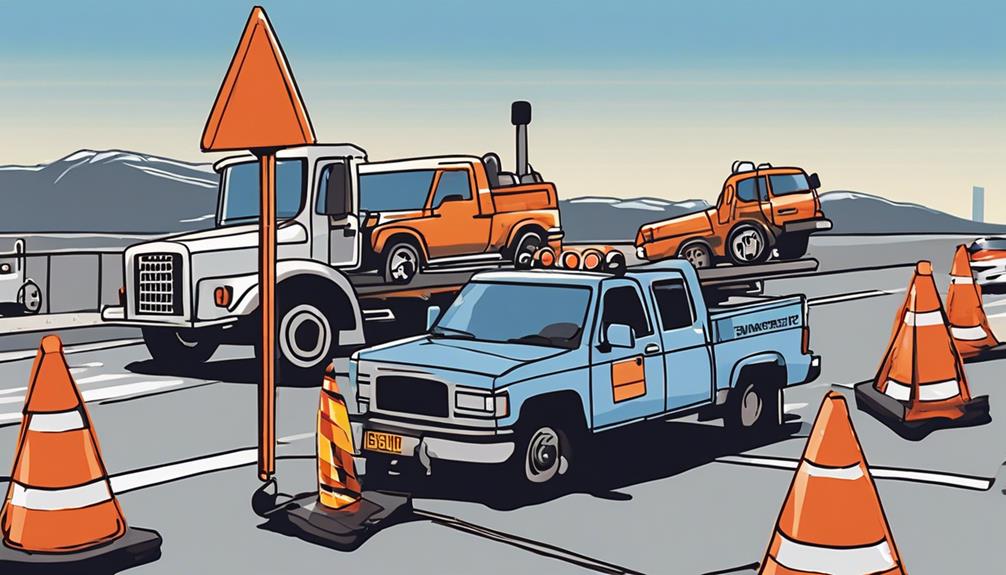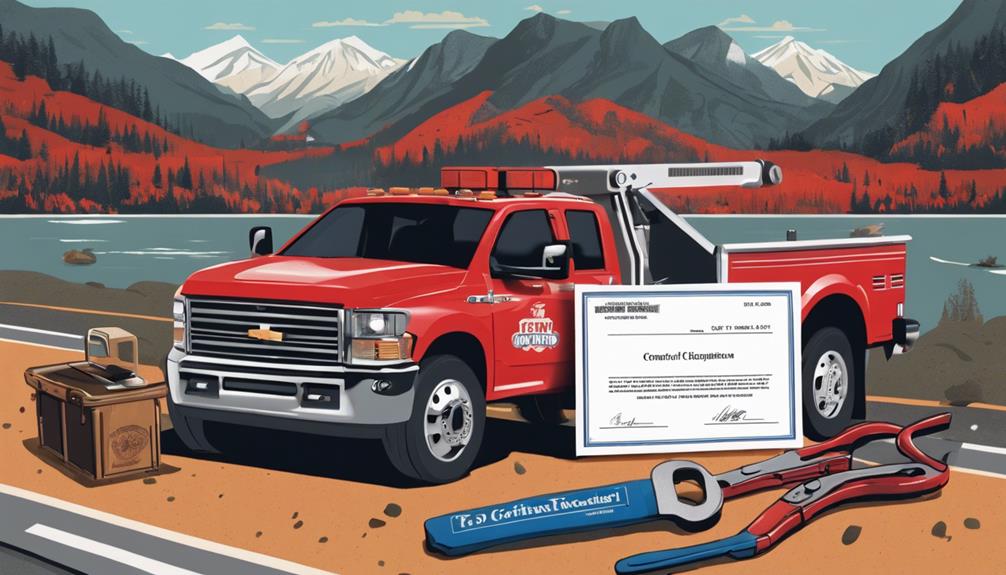As a registered tow truck operator in Washington, you might find yourself navigating the complexities of the $5,000 bond requirement. This bond isn't just a formality; it plays a crucial role in ensuring compliance with regulations and protecting consumers. You might wonder how this bond impacts your business reputation and customer trust. Moreover, what challenges could arise as you strive to maintain this bond? Understanding these nuances can significantly influence your operations, and the implications could extend far beyond what you expect.
Understanding the ,000 Bond

When you're venturing into the world of registered tow truck operations, understanding the ,000 bond is crucial. This bond acts as a financial safeguard for your business, ensuring that you comply with state regulations and protect your clients. Essentially, it's a promise that you'll operate ethically and legally in your towing practices.
Additionally, similar to Louisiana Surety Bonds, the bond helps facilitate the safe operation of your towing services while providing financial assurance to your clients and local authorities.
Obtaining this bond involves working with a surety company, which assesses your business's credibility and financial stability. They'll evaluate your credit history, business experience, and even your financial statements. If you meet their criteria, they'll issue you the bond, often requiring a percentage of the bond amount as a premium.
You need to keep in mind that this isn't just a formality; it's a requirement for operating legally in many states. Failure to secure the bond can lead to fines or the inability to operate your towing business.
Additionally, staying in compliance with bond terms is essential. If you're found in violation, claims can be made against the bond, which can impact your business's reputation and finances.
Purpose of the Bond
The purpose of the $5,000 bond goes beyond just meeting regulatory requirements; it serves to protect consumers and uphold ethical standards in the towing industry. By securing this bond, you demonstrate your commitment to operating a trustworthy towing business.
It ensures that you're financially accountable for any misconduct or failure to adhere to regulations. Additionally, having a bond aligns with the industry's best practices, as it's essential for businesses participating in contracts requiring surety, such as those involving towing services surety bonding needs.
If you were to engage in unethical practices, such as overcharging or damaging a vehicle, the bond provides a financial safety net for your clients. They can file a claim against the bond to recover losses, which encourages you to maintain high standards of service. This fosters trust between you and the community you serve.
Moreover, having a bond can enhance your reputation, making it easier to attract customers. People tend to prefer businesses that show accountability and reliability. The bond also acts as a deterrent against misconduct, motivating you to follow industry regulations closely.
In essence, the $5,000 bond isn't just a formality; it's a vital tool that promotes integrity, protects consumers, and ensures you operate within the law, ultimately benefiting both your business and the community.
Who Needs the Bond?

Who needs the registered tow truck operator bond? If you're planning to operate a tow truck business in Washington, you'll need this bond. It's a requirement for all tow truck operators who want to legally provide towing services in the state. This bond ensures that you adhere to local laws and regulations while providing your services.
Additionally, if you're a business owner in the towing industry, you'll also need this bond to protect your customers and the public. It acts as a financial guarantee that you'll fulfill your obligations and comply with the law. If you fail to do so, affected parties can file a claim against your bond, which could lead to financial penalties for you.
Moreover, if you're looking to obtain a license to operate a tow truck, the registered tow truck operator bond is one of the essential requirements. Without it, you won't be able to get your license approved.
Benefits for Tow Truck Operators
Operating as a registered tow truck operator brings several key benefits that can enhance your business and reputation.
First and foremost, being registered instills trust in your customers. When they see that you're compliant with state regulations, they're more likely to choose your services over competitors who may not be licensed. Additionally, having the required insurance broker bonds helps protect consumers and ensures that you're held accountable for ethical conduct.
A registered status often opens doors to more lucrative contracts with businesses and municipalities. These entities prefer working with licensed operators, ensuring reliability and professionalism. This can lead to consistent work and a steady income stream.
Moreover, having the required bond protects you and your clients. It acts as a safety net in case of disputes, helping to resolve issues amicably and maintaining your business's integrity.
You'll also benefit from networking opportunities within the industry, connecting with other professionals and possibly gaining referrals. Lastly, by operating legally, you avoid the risks associated with fines or penalties, allowing you to focus on growing your business.
Impact on Public Safety

Registered tow truck operators play a crucial role in enhancing public safety on the roads. When vehicles break down or are involved in accidents, these professionals quickly respond to clear hazards and prevent further incidents. Their timely actions reduce the risk of secondary accidents, keeping both motorists and pedestrians safe.
By being licensed and bonded, tow truck operators demonstrate their commitment to following regulations and industry standards. This bond assures you that they're financially responsible, which means they're more likely to adhere to ethical practices. When you see a registered tow truck on the scene, you can trust that they're trained to manage the situation effectively.
Moreover, their presence helps maintain traffic flow, minimizing congestion that can lead to frustration and risky driving behavior. You'll notice that an efficient towing operation not only clears the road but also brings a sense of security to those who witness the event.
In essence, registered tow truck operators act as a vital safety net, ensuring that emergency situations are handled properly. Their professionalism directly contributes to safer roads for everyone, making their role essential in maintaining public safety.
How to Obtain the Bond
To obtain a registered tow truck operator bond, you'll first need to check your state's specific requirements, as these can vary significantly. In Washington, for instance, you're required to secure a $5,000 bond.
Start by gathering the necessary documentation, which typically includes your business license, proof of insurance, and identification.
Next, you'll want to approach a surety bond company or an insurance provider that specializes in these types of bonds. They'll assess your application, financial history, and business details to determine your eligibility.
Be prepared to answer questions regarding your towing operations and any past incidents that may impact your bond approval.
Once you've selected a surety, you'll need to fill out an application. This may involve providing personal and business information, and you might've to pay a premium, which is a percentage of the bond amount.
After your application is approved, the surety will issue the bond, and you'll need to file it with the appropriate state agency. Keep a copy for your records, as you'll need to present it when renewing your operator's license or during inspections.
Bond Renewal Process

Renewing your tow truck operator bond is essential to maintain compliance and ensure your business runs smoothly. The renewal process typically begins 30 to 60 days before your bond's expiration date, giving you ample time to address any potential issues.
Start by reviewing your current bond terms and any changes in state regulations that may affect your renewal.
Next, reach out to your surety bond provider. They'll guide you through the necessary steps and may require updated information about your business operations. Be prepared to provide financial documents, such as your profit and loss statements, as these can influence your bond premium.
Once you have all the required documentation, submit your renewal application. The surety will evaluate your information and determine your eligibility for renewal.
If everything checks out, you'll receive your new bond documents. Make sure to review them carefully for accuracy.
Compliance and Regulations
Maintaining compliance with state and local regulations is vital for tow truck operators. You need to familiarize yourself with the specific rules governing towing in your area, as they can vary significantly. From licensing requirements to operational guidelines, each regulation plays a crucial role in ensuring you run your business legally and safely.
First, ensure your tow truck is properly registered and meets all safety standards. This includes regular inspections and maintenance to avoid potential fines or accidents.
Next, be aware of the necessary permits for operating in certain zones, especially in urban areas where regulations can be stricter.
Additionally, you must keep your insurance up to date and maintain your $5,000 bond, which protects your clients and ensures you're financially accountable.
You should also stay informed about changes in laws, as regulatory updates can occur frequently. Subscribing to industry newsletters or joining professional associations can help you keep track of these changes.
Common Challenges Faced

Tow truck operators face a variety of common challenges that can impact their business. One significant hurdle is dealing with unpredictable weather conditions. Rain, snow, or icy roads can make it difficult to reach stranded vehicles safely and efficiently.
Additionally, long hours on the road can lead to fatigue, affecting your ability to respond to calls promptly.
Another challenge is managing customer expectations. You might encounter frustrated customers who expect immediate service, which can be tough when you're juggling multiple calls. Balancing your time effectively is crucial to maintaining customer satisfaction.
Moreover, competition in the towing industry can be fierce. You'll need to differentiate your services to stand out, whether through pricing, customer service, or specialized towing options.
Lastly, regulatory compliance can be daunting. Staying up-to-date with local laws and safety regulations requires constant attention and effort. Failing to comply can result in fines or even loss of your towing license.
These challenges are part of the daily grind in the towing business, but addressing them head-on can help you build a successful and resilient operation.
Resources for Tow Operators
For successful tow operators, accessing the right resources can make a significant difference in daily operations and long-term growth. Start by tapping into industry associations like the American Towman Association or local tow truck operator groups. These organizations offer valuable training, networking opportunities, and industry updates that can keep you informed and connected.
Consider investing in software solutions designed specifically for tow truck management. These tools streamline dispatching, billing, and tracking, making your operations more efficient. You'll save time and reduce errors, which can enhance customer satisfaction.
Don't forget to stay updated on local laws and regulations affecting your business. Resources like the Washington State Department of Licensing provide essential information on licensing, bonding, and operational guidelines.
Additionally, online forums and social media groups dedicated to tow operators can be treasure troves of information. Engaging with peers allows you to share experiences and solutions, helping you tackle challenges more effectively.
Conclusion
In summary, securing the $5,000 bond as a registered tow truck operator in Washington state isn't just a regulatory requirement; it's a vital step towards building trust with your customers and enhancing your business reputation. By committing to these standards, you contribute to safer roadways and better service quality. Remember, staying compliant not only protects you but also ensures a positive experience for those you serve—making it a win-win for everyone involved.


